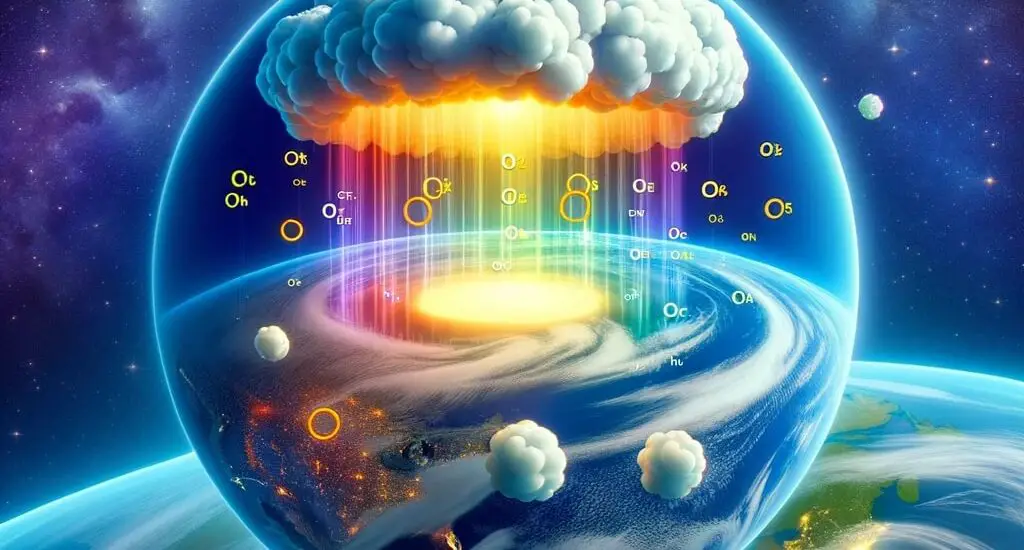If you’re looking to understand how freon impacts the ozone layer, you’ve come to the right place. This article provides an easy-to-follow, step-by-step explanation of the relationship between Freon and Ozone layer, why it’s a concern, and what you can do about it.

Table of Contents
What Is Freon?
Firstly, it’s important to note that Freon is a brand name, not the name of a specific chemical. Freon represents a variety of chlorofluorocarbons (CFCs), which are man-made compounds. They’re composed of carbon, fluorine, and chlorine atoms.
Developed in the late 1920s, Freon was hailed as a wonder chemical for its non-toxic, non-flammable, and highly stable properties. It became popularly used in air conditioners, refrigerators, and even aerosol sprays.
Its stability means it doesn’t react easily with other chemicals, which makes it ideal for use in various appliances. However, this stability is also what makes it harmful when released into the atmosphere, as it persists for a long time before breaking down.
What Is the Ozone Layer?
The ozone layer is a crucial part of Earth’s atmosphere, located about 10 to 30 miles above the surface. It’s primarily composed of ozone molecules, which consist of three oxygen atoms. This layer serves as a protective shield, filtering out the majority of the sun’s harmful ultraviolet (UV) rays.
There are different types of UV radiation: UV-A, UV-B, and UV-C. The ozone layer is particularly effective in blocking out almost all UV-C rays and a significant portion of UV-B rays, which are the most harmful types of UV radiation. By doing so, the ozone layer plays a vital role in protecting life on Earth.
What is the Connection Between Freon and Ozone Layer?
When Freon is released into the atmosphere, usually through leaks in refrigeration systems or improper disposal of appliances, it begins to ascend into the stratosphere. Once it reaches this layer, it encounters UV radiation from the sun. The UV radiation breaks down Freon, releasing chlorine atoms in a process known as photodissociation.
These chlorine atoms are highly reactive when they come into contact with ozone molecules. They act as a catalyst in a chemical reaction that leads to the breakdown of ozone into individual oxygen molecules. The most alarming part is that a single chlorine atom can destroy thousands of ozone molecules before becoming inactive. This results in a thinning of the ozone layer, known as ozone depletion.
Why Is This a Concern?
Ozone depletion has far-reaching implications. For humans, more exposure to harmful UV rays increases the risk of skin cancer, eye cataracts, and other UV-induced health issues. Children are particularly vulnerable to the damaging effects of UV radiation.
From an ecological perspective, increased UV radiation can harm marine ecosystems. Phytoplankton, which serves as the foundation of the marine food web, is particularly susceptible. An imbalance in phytoplankton levels can set off a chain reaction, affecting various forms of marine life. Furthermore, increased UV levels can also lead to more severe weather patterns and have an impact on terrestrial ecosystems.
What Can You Do?
Fortunately, there are several actionable steps you can take to mitigate the damage.
Switch to Eco-Friendly Refrigerants: Many modern air conditioning systems use refrigerants that are less harmful to the ozone layer. Look for products labeled as ozone-friendly.
Proper Disposal: If you are getting rid of an old air conditioner, refrigerator, or any other appliance containing Freon, ensure you dispose of it in a manner that prevents the release of Freon into the atmosphere. Specialized recycling facilities exist for this purpose.
In need of a new refrigerator after getting rid of your old one? We recommend the Arctic King 3.2 Cu ft Two Door Mini Fridge with Freezer available at Walmart.
Regular Maintenance: Keep your cooling systems well-maintained to prevent Freon leaks. If a leak occurs, have it repaired immediately.
Be an Informed Consumer: Always read labels and educate yourself on the appliances you are buying. Opt for those that have a lesser environmental impact.
Support Legislation: Advocate for policies that seek to phase out the use of substances harmful to the ozone layer.